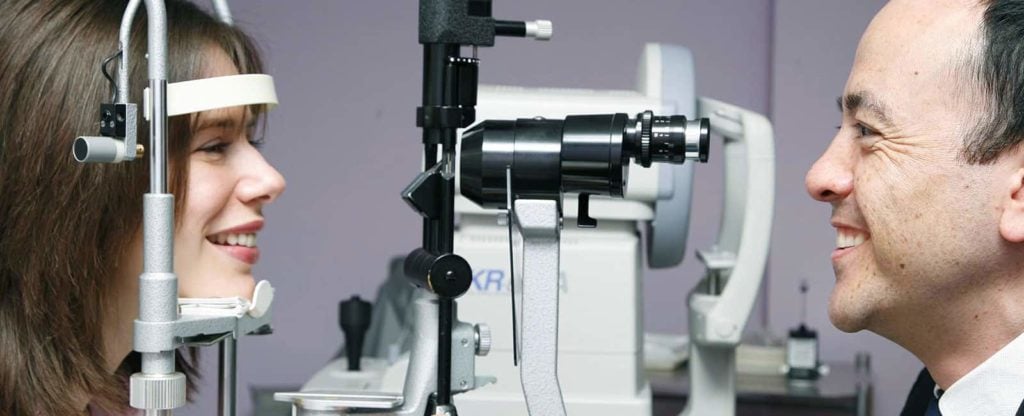Eye Floaters
Many people are aware of, or irritated by, small strands or semi-transparent specks which move with eye movement and are known as ‘floaters’, which are usually harmless. However, if you notice a sudden increase in floaters, particularly associated with flashes of light or loss of peripheral vision you should seek urgent medical attention.
450+ 5-Star Patient Reviews:


What are Floaters?
Floaters are caused by the break up and condensation of the vitreous humour gel which fills the cavity of the eyeball and occupies the space behind the crystalline lens to the retina and optic nerve. This vitreous gel is transparent and clear in early life so that light passing through it can be focused clearly onto the retina to form an image. As we age the vitreous shrinks and partially liquifies causing clumping of the proteins which then cast a shadow on the retina as light passes through. These shadows are visible as floaters, dark specs or transparent strings often referred to as a cobweb and move with movement of the eye. Floaters are often most noticeable against a plain or bright background such as a blue sky or white wall, they usually settle and move out of the line of vision.
What Causes Floaters?

Most floaters occur as a natural ageing process of the eye and cause no harm. Although they can be quite noticeable when they first appear our brain is effective at ignoring them or switching our visual attention to the other eye. As the vitreous gel liquifies it will eventually pull away from the back of the eye and the part of the gel that was attached to the optic nerve is often seen as a larger central floater often described as a ‘fly’ or ‘large cobweb’ which suddenly appears. This is called a Posterior Vitreous Detachment (PVD) and the area that was attached around the optic nerve is called a Weiss Ring.
Risk factors for floaters include:
- Age over 50 years
- Myopia or short-sightedness
- Eye trauma or injury
- Diabetic retinopathy
- Cataract surgery
- Inflammation of the eye
Other Causes Include:
If the vitreous pulls on the retina as it separates, particularly when a PVD occurs it can tear the retina. If this is diagnosed quickly, the tear can often be treated by laser but if treatment is delayed a retinal detachment may occur which will lead to permanent visual loss if not surgically repaired. A retinal tear or detachment is an ophthalmic emergency and you should seek medical attention immediately if you experience these symptoms.
Any cause of bleeding within the eye will result in floaters, usually experienced as the sudden onset of lots of fine floaters. Bleeds may result through vitreous traction but also diabetes, blocked blood vessels or injury.
The eye has a vascular coat that provides nutrients to the eye, this is called the uveal tract. Inflammation of the uvea in the back of the eye is called posterior uveitis and inflammatory cells released into the vitreous may be seen as floaters.
There are a number of medications which may be injected into the eye e.g. anti VEGF treatment for AMD or dexamethasone used to treat macular oedema. Along with surgery using silicone oil these medications or tiny air bubbles associated with them may be visible until they are absorbed.
Treatment of Floaters
Most people will develop floaters and not require treatment. Some however, will experience symptoms that have a significant effect on vision and their quality of life and require treatment. Treatment falls into two main categories: Vitrectomy Surgery and Laser Vitreolysis.
Vitrectomy Surgery
A specialist vitreoretinal surgeon will remove the vitreous gel through tiny self-sealing incisions. Vitrectomy or Pars Plana Vitrectomy (PPV) is usually performed using local anaesthetic with the procedure typically taking around 30 – 40 minutes. Vitrectomy has a high rate of success but floaters can develop after surgery and complications though rare include bleeding, infection and retinal tear or detachment.
Laser Vitreolysis
A YAG laser can be used to disrupt larger floaters within the vitreous gel breaking them up into smaller and less noticeable floaters, treatment is particularly useful to break up a large or central discrete Weiss ring situated away from the retina. Nano pulses of laser effectively evaporate the vitreous into small gas bubbles and can be used to cut long strands of gel. Risks of laser vitreolysis include cataract, raised pressure in the eye and retinal damage by the laser.

